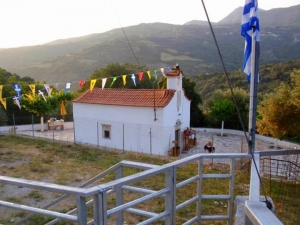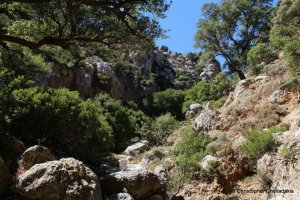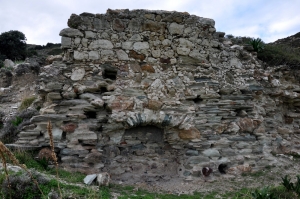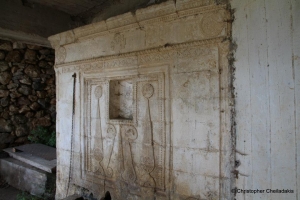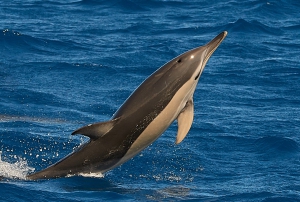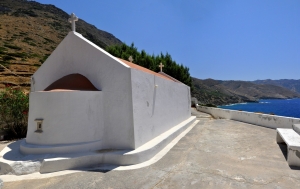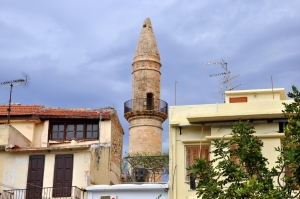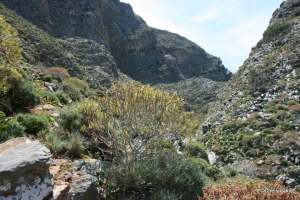Ο Άγιος Γεώργιος Γαλατάς στην Ασή Γωνιά είναι μικρός μονόχωρος ναός στα όρια του χωριού. Στο ναό αυτό λαμβάνει χώρα ένα από τα πιο παλιά και γνωστά έθιμα της Κρήτης κατά την εορτή του Αγίου Γεωργίου στις 23 Απριλίου.
Half an hour above the archaeological site of Lissos, in a totally secret position called Lichnou Laki there is a small and very beautiful canyon. The gorge is located in the district of Selino, below Prodromi village, south of Chania and its entrance is accessed by a dirt road that runs from the village (to the south). The very small canyon is quite green and is divided into two different sections. The first section is dominated by lentisks, junipers and oaks and the second is covered by pine trees despite the destructive fire that had previously burnt the region.
Εδώ θα δείτε τα ερείπια από το Μοναστήρι της Παναγίας της Φρασκιάς (Faschea) που αποτυπώνεται σε όλους σχεδόν τους χάρτες της Βενετοκρατίας, ένα από τα σημαντικότερα της Ενετικής Κρήτης.
Αυτό που χαρακτηρίζει το χωριό Κισσός στην επαρχία του Αγίου Βασιλείου Ρεθύμνου, όπως και όλα τα χωριά που βρίσκονται στη ρίζα του Όρους Κέντρος είναι οι πολλές πηγές νερού. Και πραγματικά μέσα στο χωριό αλλά και στην ευρύτερη περιφέρειά του υπάρχουν πολλά σημεία που πηγάζει νερό δίνοντας ζωή στην περιοχή. Στην κεντρική πλατεία του χωριού που σήμερα υποφέρει από την εγκατάλειψη και την αστυφιλία συναντάμε την όμορφη πλατεία του Γεροπλάτανου. Ο Γεροπλάτανος στην ουσία είναι δυο αιωνόβια πλατάνια το ένα κοντά στο άλλο που ειδικά το ένα είναι από τα μεγαλύτερα που υπάρχουν σε ολόκληρη την Κρήτη κι έχει πραγματικά επιβλητικό κορμό.
The common short-beaked dolphin (scient. Delphinus delphis) was once the most common dolphin species in Greece, but unfortunately it is nowadays threatened with extinction. Indeed, the name “common” was firstly given by Aristotle in ancient times, due to its abundance in Greek Seas. Today it lives mainly in the Ionian Sea and is rarely found in Crete.
Κάτω από το Λιόπετρο υπάρχει ο πολύ παλιός ναός του Αγίου Ιωάννη, που λειτούργησε ως μοναστήρι, προσβάσιμος μέσω πολύ κακού χωματόδρομου που ξεκινάει από την Εθνική Οδό Λασιθίου Σητείας (αρχικά είναι τσιμεντόδρομος). Το φόντο με τους φυλλιτικούς βράχους του Λιόπετρου είναι επιβλητικό.
Ο μιναρές από το τζαμί της Τουρχάν Χαντιτζέ δεσπόζει ακόμη στην κεντρική πλατεία του Ρεθύμνου. Η Τουρχάν Χαντιτζέ ανήκε στο χαρέμι του σουλτάνου Ιμπραήμ (1640-1648) και έγινε βασιλομήτωρ (valide sultan) το 1648, όταν έγινε σουλτάνος ο γιος της, Μεχμέτ Δ’.
Το παντελώς άγνωστο φαράγγι Κουρούκουλος ξεκινάει από το σχεδόν ερειπωμένο (3 κάτοικοι) χωριό Αγαλιανό στην επαρχία Μεραμπέλου Λασιθίου. Από το χωριό και ακολουθώντας παλιό μονοπάτι μπαίνουμε στην κοίτη η οποία είναι βατή για πεζοπορία σε όλο της το μήκος.











